Robbing Peter to Pay Paul
The story and the man behind the Ponzi Scheme
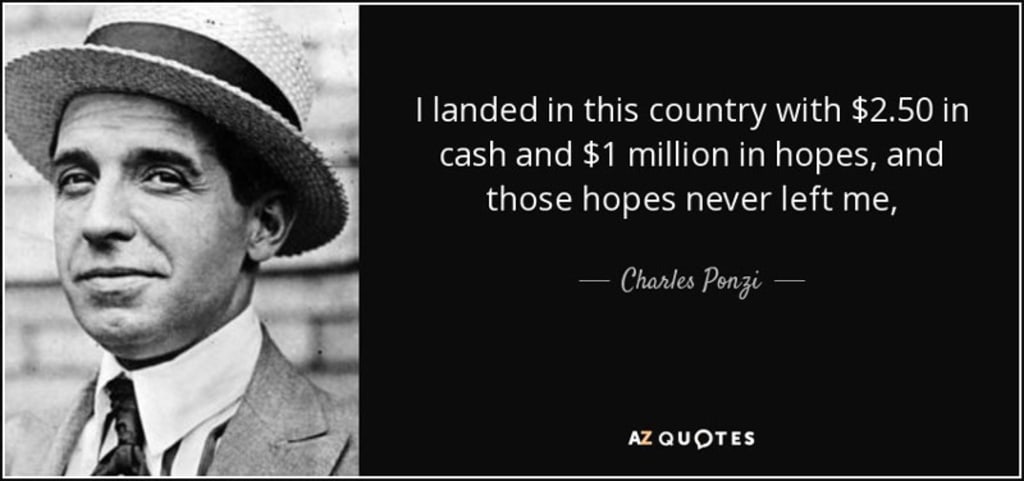
Research into this story came when my youngest son asked me what a Ponzi scheme was. He is learning about economic in school, and financial questions in my house is a new thing. For example- how does the health care industry work? Why do we pay health insurance and still have to pay medical bills? What is interest and who gets to decide what the interest rate is going to be? Why do we have credit cards? How do you get a mortgage? How does the government know how much taxes to charge and how do you know that you are not paying too much? Now, I know that many of you think that these are simple questions- but go ahead, break it down for a 13-year-old in a way that makes sense. I will wait....
Were you able to do it? Because I can't. Every time I go to explain these complex ideas, he hits me with one last question- who are 'they' and why do 'they' get decide? Shit- I don't know who 'they' are. Now I have some questions! Where do they work? Are they rich? Do 'they' have a degree in economics? Are 'they' even real people? Do ‘they’ have an email address, I need some answers!
So, the latest and greatest question that he hit me with was on the Ponzi scheme. Now this really worked out because it fits into my research for a book on the 1920’s, and it is Sunday morning so I know that I have quite a bit of time to research and get the answers before he even wakes up. So here I am stressing about explaining this concept to my son, and using you as dress rehearsal.
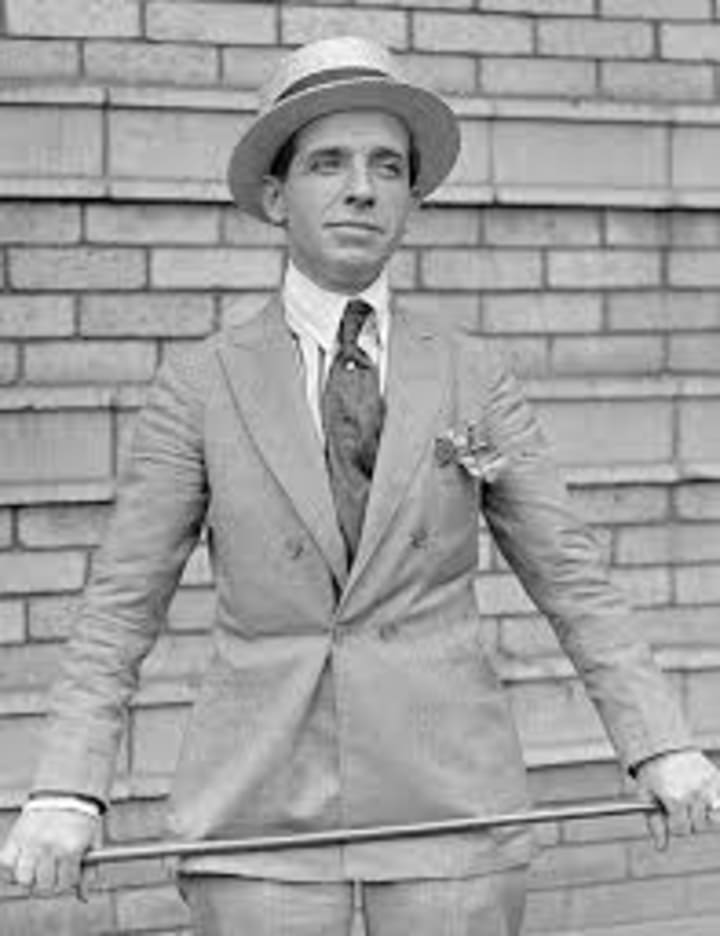
The Ponzi Scheme
First thing first- let's look at the history of the person behind the Ponzi scheme (yes, he was a real person). He was born on March 3, 1882 and named Carlo Pietro Giovanni Guglielmo Tebaldo Ponzi- but we will call him Charles for short. It is believed that Charles Ponzi was born in Parma, Italy or it might have been Lugo, Italy- depending on the website you are looking at. Charles claimed that he attended the University of Rome La Sapienze, but I can't for the life of me find any proof.
That is what we know about his beginnings, really nothing more. We do know for a fact that he arrived in Boston in November of 1903 by way of the S.S. Vancouver and that he told the New York Times that he gambled away all of his savings on that voyage. So, Charles stands on the shores of this great country with only $2.50 and according to him ‘$1 million in hopes.’
It didn’t work out to well for him in America because he ends up moving to Montreal in 1907 where he worked as a bank teller at Bank Zarossi. This particular bank was formed around the idea of providing high interest rate loans to newly arrive Italian immigrants. Surprise, surprise- the bank goes bankrupt because no newly arrived immigrant can pay back high interest loans. Crap, I have a hard-enough time paying off low interest loans and I am pretty well established. The bank failing leads to Charles becoming broke himself, and gets caught, charged, and sentenced to 3 years in a Quebec prison for writing bad checks. Getting out of prison, he makes the grand decision to start smuggling Italian immigrants across the Canadian border into the U.S. This decision costs him 2 years in an Atlanta jail when he gets caught. This guy is a winner!
In 1918, Charles is finally out of jail and it looks like his life is going to turn around because he meets and marries Rose Gnecco who was a local stenographer. Charles worked for his father-in-law for a while, but that didn’t really pan out. It was sometime around here that Charles received a letter from a company in Spain that contained in it an International Reply Coupon or an IRC and he has an ah-ha moment! Charles realizes that he can make a profit by buying IRCs in one country and exchange them for more expensive stamps in another country. Brilliant! Do you understand? I didn’t! So, more research!
We have to understand what an IRC is to understand why this is important. An IRC is a coupon that can be exchanged for priority airmail postage stamps from another country. So, for example, I send a letter to Italy and want to ensure that I get a reply. So, I buy an IRC, or a mail money-order, that the receiver can use to buy postage to send the letter back to me. I think that it is going to cost $5.00 to send the letter back, so I send a $5.00 ‘check’ or IRC to the other person. They go to the post office, and it is only going to cost them $2.50 to send it to me because of the cost difference between the two countries. The receiver has now made a profit of $2.50 without lifting a finger. Are we all tracking? I hope I haven’t lost anyone.
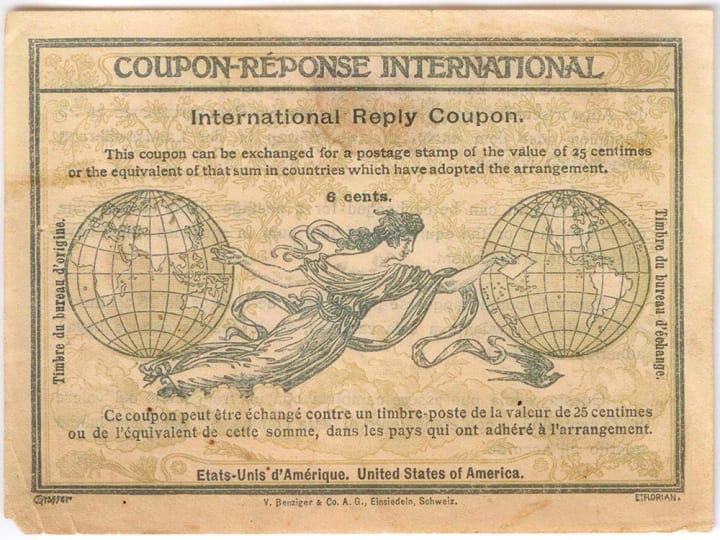
Charles set his business up using this scheme calling it the Securities Exchange Company. He would send his ‘agents’ money to buy a mass of IRCs and then send them back to the U.S. Charles would then exchange those IRCs for stamps worth more that he paid for them, and then turn around and sell the stamps. It is believed that he was making more than a 400% return on some of the sales.
That was not enough for Charles, he needed more. And we all know what happens when you need more! More coffee, more Oreo’s, more Christmas decorations, more plants and flower shrubs in the spring, more shoes…it leads you down a rabbit hole of no return! Well, until your spouse cuts you off and you change your attention to Hallmark Christmas ornaments or heaven help us…garden Nome's! Charles was in this rabbit hole when he began to seek investors to turn higher profits. He promised his investors returns of 50% in 45 days, or if you were patient, 100% in 90 days.
He had found himself so many investors in this scheme that he was able to buy a 12-room mansion in Lexington, Massachusetts that had a heated swimming pool and air conditioning. He had servants, automobiles, a custom built limousine, gold-handled Malacca canes, started purchasing commercial and residential properties, and buying stocks in several banks. And in the 1920’s this was as bougie as it comes, he was a up and coming J.P Morgan.
The Boston Post gets wind of the story of a newly self-made immigrant in July 1920 and the $1 million dollar law suit that was filed against him by a man named Joseph Daniels who laid claim to a share of Charles’s fortune because of an old debt. They printed a story on July 24, 1920, with Ponzi on the front page- 'Doubles The Money Within Three Months; 50 Per Cent Interest Paid in 45 Days by Ponzi- Has Thousands of Investors'. The newspaper claims that Charles’s net worth at this point is about $8.5 million. You would think that this would have scared people away, that he was facing such a large lawsuit, but no it drove middle-class citizens with their lifesavings to his door and on July 26th, Charles later recalled:
A huge line of investors, four abreast, stretched from the City Hall Annex, through City Hall Avenue and School Street, to the entrance of the Niles Building, up stairways, along the corridors...all the way to my office... Hope and greed could be read in everybody's countenance. Guessed from the wads of money nervously clutched and waved by thousands of outstretched fists! Madness, money madness, the worst kind of madness, was reflected in everybody's eyes... To the crowd there assembled, I was the realization of their dreams.... The ‘wizard' who could turn a pauper into a millionaire overnight!
This is where the story gets interesting! Charles finds out that same day, that he had not only made the news, but that he was also gotten on the radar of the U.S. Post Office Department earlier that year and he was under investigation. However, the U.S. Post Office Department was understaffed and overworked and they had not made any real headway with their efforts. But now that the newspapers were also looking into his affairs, it might not turn out well for him.
Charles, on the advice of his friend William McMasters, a former newspaperman and his publicity agent, offered to cooperate with the U.S. District Attorney’s office and allows them to conduct an audit on his books with a promise to not accept new investments until the audit was complete. This is the action that concerns the masses and thousands stormed his office demanding to have their money returned to them. Charles, always the kind businessman, told his clerks to refund the money of anyone who presented a voucher- but they were only going to get their principal back and not the interest. In that one day, Charles paid back a little over 1 million dollars, saving himself the considerable interest that he had occurred.
Are you still with me? Good! Go ahead, go refill your coffee mug…because there is more to the story!
Deep dramatic breath….. and go…..
Charles was a cocky son-of-a-b**ch! He played so many games during the investigation, at one point saying to the Washington Post that 'My secret is how to cash the coupons. I do not tell it to anyone,' he asserted. 'Let the United States find it out, if it can.'
The Boston Post, not to be outdone by the Washington Post writes an article entitle 'Officials balked By Ponzi Puzzle'. Even with all this negative publicity- Charles is still loved by many and hated by only a few, because he is one of them. Finally, there was an immigrant who was beating the government at its own game.
Until, ta-da…. his publicity agent turns on him! McMasters wrote a copyrighted, first hand report that stated "He is over $2,000,000 in debt even if he tried to meet his notes without paying any interest…If the interest is included on his outstanding notes, then he is at least $4,500,000 in debt." Charles is pissed and threatens to sue The Post and McMasters.
But now the public is really paying attention, and they want to be involved in the investigation and/or figure out how Charles has made all this money with little to no work. On August 10th, the Kiwanis Club invites Charles to a luncheon where he would be paired with a mind-reader named Joseph Dunninger. The Kiwanis Club had hoped that Dunninger would read Charles’s mind and reveal his secrets to success. Charles wins the audience over with his personality and claims that he worked hand-in-hand with foreign governments in order to buy the coupons and because the governments profited themselves from the business, the “naturally would not care to reveal” the nature of their relationship with Charles. His showmanship gets reported to the news outlet: 'PONZI TELLS KIWANIS CLUB HOW HE GOT HIS MILLIONS,' the Globe cried from its front page. Editors at the Chicago Tribune, which also described the Kiwanis Club affair, were more cynical: 'PONZI REVEALS PHILOSOPHER'S STONE: 0+0=$,' the headline ran.
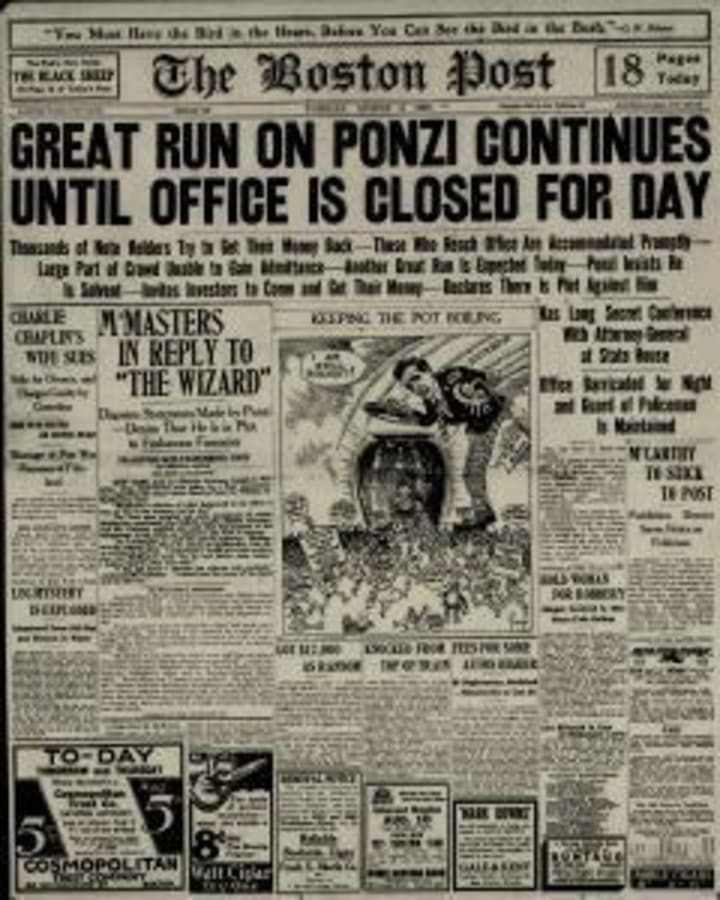
And then on August 11th, the newspapers start printing the story on Charles and his criminal background citing his charges of forging checks and smugglings immigrants. This is not looking good for Charles...his imagine of the friendly local immigrant who made millions through his hard work is fading fast. Now he is being portrayed as a common criminal
By sheer luck or bad-luck, on Aug 12th, the government auditor is finished looking over Charles’s book and finds him to be $3 million in the red, later revised to $7 million. Charles is arrested and the Boston Evening Globe reports 'PONZI WEARING HIS SMILE EVEN IN EAST CAMBRIDGE JAIL,'.
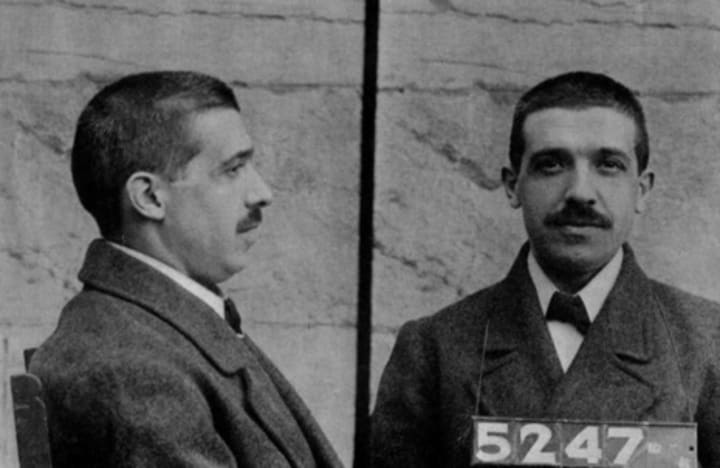
Charles gets sentenced to 5 years in prison, but only ends up serving 3 ½ years and then put-on parole. However, in 1925 he is charged and convicted on state fraud charges. While on bail and the verdict was on appeal- he jumps ship and heads to Florida where he starts sailing swampland to raise money under the name Charpon. He is arrested in Florida for fraud and jumps ship again when he finds out that the Supreme Judicial Court of Massachusetts upheld his conviction of state fraud. Now he is wanted in Florida and Massachusetts. So, he goes to Texas and becomes a seaman on an Italian freighter. He gets caught in New Orleans, probably while drinking a hurricane- those things are dangerously good and you easily let down your guard after only one.
Charles is sent back to Massachusetts to serve his time and is released in 1934, reportedly bald and 40 pounds heavier. But wait there is more! He was never an American citizen! They want to deport him. Charles fights the deportation, but the country doesn't want him here anymore, he caused too many issues- and off he goes! This whole time, Rose (the wife) is still married to him! If there is anything to be said about Rose’s- we are dedicated people to the end! But, after waiting two years for him to send for her, she finally divorces his short ass and remarries a nice guy.
Charles had enlisted the help from a second cousin who was a friend of Mussolini and a Col. in the Italian Air Force and gets a job with an airline that did business between Italy and Brazil. Charles made great money until World War II started and the Brazilian government learned that the airline was ferrying strategic supplies to Italy. The Brazilian government cut off the relationship, and Charles was stuck in Brazil.
Now, Charles didn’t do horrible in Brazil- he taught English and French and worked as an interpreter for an Italian importing firm. But in 1948, Charles’s eye sight was failing and he suffered a stroke that left him partially paralyzed. He died in 1949 in a charity hospital, Hospital São Francisco de Assis of Federal University, in Rio de Janeiro with only $75.00 to his name to pay for the burial.
Curtain drops…..
Charles did write the following, that I think sums up this whole crazy story-
"Even if they never got anything for it, it was cheap at that price. Without malice aforethought I had given them the best show that was ever staged in their territory since the landing of the Pilgrims!... It was easily worth fifteen million bucks to watch me put the thing over!"
And that is the true story of Charles Ponzi. Now, he was not at all the first person to do this! He was just the most famous. I already hear the questions that my son is going to ask me when I tell him this story. Isn’t this what credit card companies do to people now? Rob Paul to pay Peter? I am still no closure to answering his financial questions. Can someone come over and help explain them for me? Please? I will pay you with coffee!
About the Creator
Rose Loren Geer-Robbins
One does not simply become a famous writer! It takes many hours before the sun comes up and even more when the sun sets. I am never sure what world I am living in, the one that I am writing about or reality.


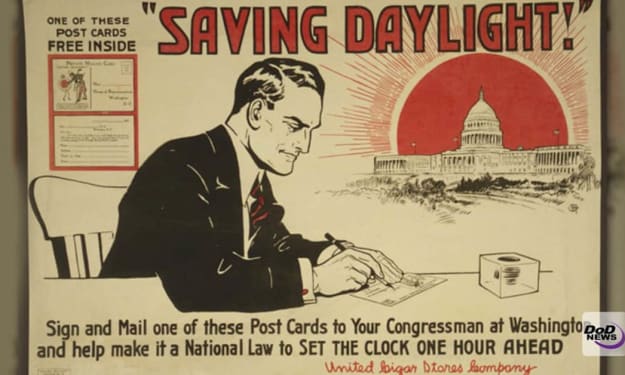



Comments
There are no comments for this story
Be the first to respond and start the conversation.